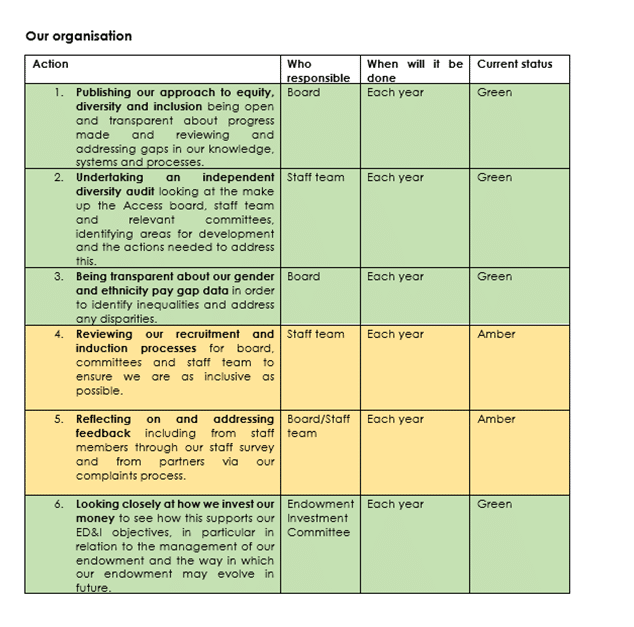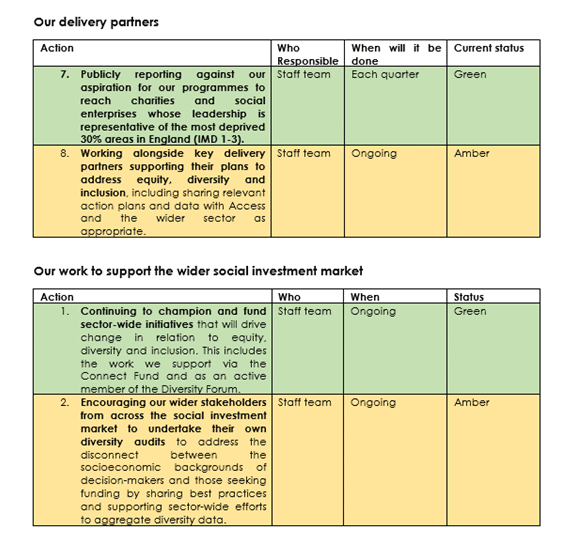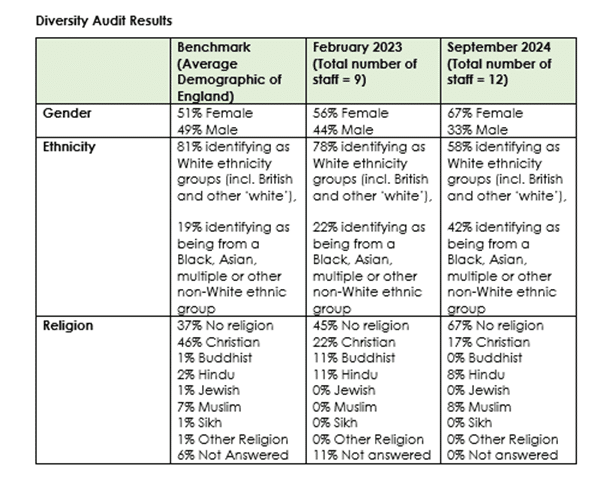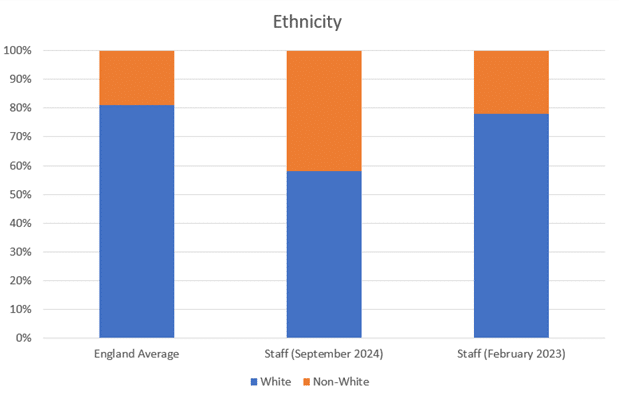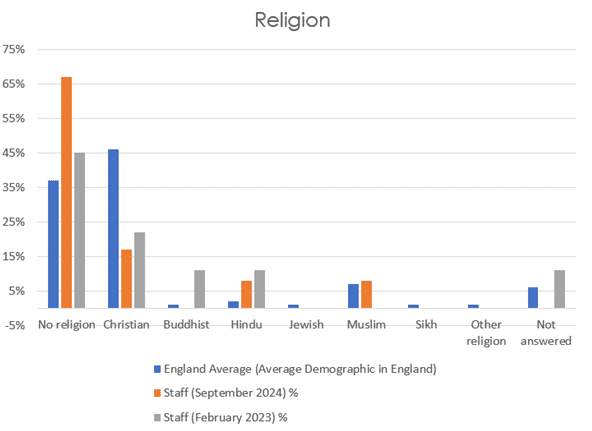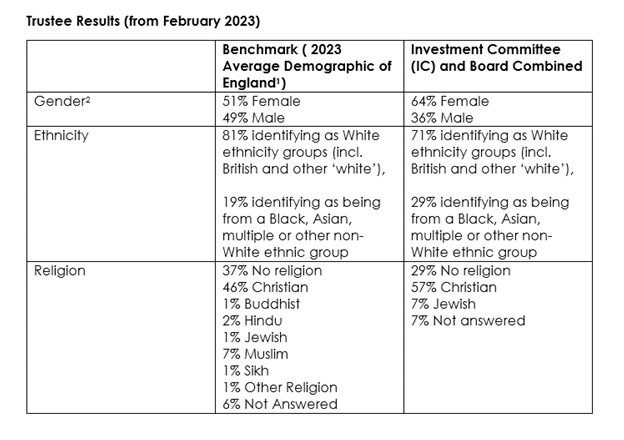Our vision
Access wants to see an investment eco-system that works for all charities and social enterprises. This means harnessing all of the diverse talent seeking to deliver impact in communities. It requires an investment ecosystem which is able to deliver equitable outcomes for communities impacted by injustice and inequality and the charities and social enterprises that support them.
This work is fundamentally about shifting imbalances in power, perspectives and opportunities and building a culture of equal recognition and belonging by actively inviting the contribution and participation of everyone we work with.
Our progress
As the people ultimately responsible for Access as an organisation, our trustee board is collectively responsible for our work on equity, diversity and inclusion and CEO, Seb Elsworth, leads on implementation. We are grateful to a range of people and organisations across the social investment ecosystem who have led the way on this agenda – not least the Diversity Forum which exists to drive inclusive social investment in the UK.
We know we have much to learn and recognise that tackling injustice and inequality in all its forms is not a tick-box exercise and something that requires ongoing commitment, attention and resource.
Our Equity, Diversity and Inclusion policy and action plan
Our Equity, Diversity and Inclusion policy and action plan sets out in detail our approach – it recognises our own influence and power (and its limitations), not only in relation to the organisation itself but also our social investment and delivery partners, the charities and social enterprises they work with and the communities they serve. It builds on the work we have done to date and the work of our partners across the social investment ecosystem – set out here in more detail on the Access blog.
Our commitments
As a national wholesaler of funding into the social investment market we have a leadership role to play in championing and realising a truly equitable, diverse and inclusive social investment sector. We think that this leadership role means being open about what we want to achieve and how we will achieve it, inviting feedback and learning as we go, sharing what is working and what is not.
In addition to a more detailed action plan for internal purposes, we have developed the below 10 priority commitments to ensure we are transparent and accountable. We have now achieved the majority of these commitments, and will be setting new EDI commitments in 2025 so that we continue to make progress.
It is worth noting that green doesn’t mean ‘done’ and red isn’t necessarily a cause for alarm – we have plans in place to address each measure and have set a direction of travel but are using the traffic light rating to rate where we have made tangible progress.
Equity, Diversity, and Inclusion Audit
Equity, Diversity, and Inclusion Audit and Pay gap Analysis
Our equity, diversity, and inclusion (EDI) strategy commits Access to a truly equitable, diverse, and inclusive social investment market and explains the actions we are taking within Access and our partner organisations to work towards this goal.
Diversity can be understood by the common and different characteristics and experiences shared by different people. Participants’ answers enable Access to report on the team’s current diversity and how this fits with the aspirations in our EDI strategy.
The reason for running this Diversity Audit is to get a better understanding of where we are and how we, as a team, represent the communities we aim to serve.
We conducted our second EDI Audit in September 2024. The first one was carried out in February 2023 by Small Change to implement our first EDI monitoring exercise as part of our implementation of our EDI Policy and Action Plan.
Our latest audit reflects Access’ permanent staff team of 12 (February 2023: 9). We did not repeat the audit for Trustees as there had been no changes in members since the last audit.
We aim for the Access team to have diverse lived and learned experience relevant for their job roles. The audit looks at ‘protected characteristics’ defined in the Equality Act (2010). This then guides the comparison with the census data on the population of England, as well as the 2023 data. Since Access works in England, the average demographics of England were benchmarked against.
Data for the audit was collected through an online survey. Building on the questionnaire in 2023, the wording and questions were adapted to be more inclusive, and to better define certain terminology. All data provided was treated as confidential, with only Access’s HR project manager having access to the raw data.
Below are the results from the September 2024 EDI audit, which will be repeated when changes occur in the team, but no more than once in a calendar year. In publishing the data from our EDI audit, we aim to balance transparency with the privacy and personal data of the wider Access team. This is why we have chosen not to publish certain data points from the audit, including sexual orientation, whether staff have any long-term health conditions, national identity, and whether staff received free school meals. Given the small number of team members at Access, we felt that it was not possible to fully publish this data while respecting the privacy of the team.
Following Access’s annual EDI Audit, a Pay Gap Analysis was conducted to identify and understand compensation trends across different groups. This analysis, conducted with strict confidentiality, focused on identifying pay disparities across gender and ethnicity. With the small team size, statistical methods and careful group analysis were used to avoid identifying individual employees. While larger organisations are legally required to report on pay gaps, Access has chosen to disclose this information voluntarily and would encourage other organisations we work with to do so as well.
We believe that our data can contribute to a better and wider understanding of the diversity and pay trends, therefore leading to a more diverse and equitable social investment sector in the UK. The more of our partners and peers that complete these exercises and are transparent about their findings, the more data we will have to draw upon.
The analysis confirms there are no equal pay anomalies (where, by law, individuals must be paid equally for the same work), however, the results below do confirm, as we knew, that we have both a gender and an ethnicity pay gap. Findings from both the audit and the pay gap analysis are very sensitive to changes in the composition of the team , so it’s important to note that, for instance, the departure of a key individual such as the CEO, would substantially alter results. While there are many limitations to the pay gap analysis, particularly given the small size of our organisation, we are hopeful that ongoing trend analysis will offer more insightful and actionable information.
While the results of the diversity audit are reassuring, in that the team has become more diverse over the last two years, we recognise that this first pay gap exercise shows that there is both a gender and an ethnicity pay gap. While this isn’t surprising for a small organisation such as us, we do have a number of measures in place to try to address it including blind recruitment processes. As we set our new EDI goals for 2025 we will also be reflecting on whether there are any which can help us improve on these pay gaps.
As we begin our trustee recruitment in early 2025, we are confident that this will help diversify the lived experience on our board.
Gender
The gender pay gap is the percentage difference between the average hourly rates of pay for women and men at Access. In 2024, the mean gender pay gap at Access was 21%, and the median gender pay gap was 8%.
Ethnicity
The ethnicity pay gap is the percentage difference between the average hourly rates of pay for Non-White and White employees at Access. In 2024, the mean ethnicity pay gap at Access was 42%. and the median ethnicity pay gap was 40%.
You can read more about our general approach to the process of conducting the diversity audit and pay gap analysis here in this blog.









